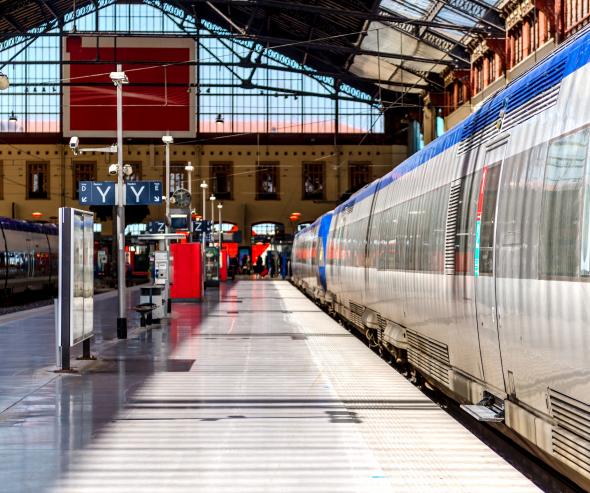28 April 2014: Sale of train tickets

The SNCF makes progress on the path to the equitable treatment of its voyages-sncf.com website and travel agencies
Within the scope of a procedure initiated before the Autorité de la concurrence, SNCF has proposed a series of commitments designed to make voyages-sncf.com and competing travel agencies subject to similar conditions in the train ticket distribution sector.
The Autorité de la concurrence is launching a market test to check whether the proposed commitments are sufficient to allay the competition concerns identified.
These draft commitments should be of a kind to put travel agencies and voyages-sncf.com on an equal footing, thus allowing both parties to differentiate themselves by diversified and more detailed offers (as prices are regulated).
AS Voyages's referral
AS Voyages, a result of the merger of the agencies Afat voyages and Selectour, complained that SNCF’s practices tend, in the sale of train tickets, to favour its subsidiary, voyages-sncf.com, to the detriment of competing travel agencies.
How train ticket reservation works
Other than SNCF’s direct sales channels (stations, agencies, self-service terminals, voyages-sncf.com), travel agencies, subject to being approved by SNCF, can distribute train tickets. To do so, they access SNCF’s online reservation system (the Résarail database). Connection to this central system is made via the technical interfaces known as Ravel and WDI, and SNCF bills for their use. In exchange, travel agencies can charge a commission on the train ticket sales that they make.
The competition concerns are related to the risks linked to a more favourable treatment of voyages-sncf.com in comparison with the competing agencies
The Autorité’s investigation services found several elements indicating that the travel agencies may be treated differently from voyages-sncf.com by SNCF.
• Unequal tariff conditions between voyages-sncf.com and competing agencies
The distribution system set up by SNCF for the sale of train tickets demonstrates a high level of complexity with different payment and billing procedures depending on whether voyages-sncf.com or competing travel agencies are involved.
• A risk of barriers to the entry of new competitors
While, for the distribution of train tickets, travel agencies have the choice of accessing SNCF’s raw data (Ravel Gold) or data that has already been sorted, interpreted and formatted (Ravel Premier and Classic), the first option has an initial pricing structure that is liable to be dissuasive. This could therefore constitute a barrier to the entry of competitors which are not yet of a sufficient critical size.
• A risk of an exchange of information between SNCF entities
The data-processing services company (VSC-T) handling requests from voyages-scnf.com and competitors, could have access to strategic information about the latter’s development plans without guaranteeing that voyages-scnf.com cannot learn of them, as no separation exists between the two entities.
• Advanced, privileged access to a new-generation itinerary generator
Voyages-sncf.com was in fact the only agency to use a new-generation itinerary generator developed by SNCF for almost a year before it was rolled out to other agencies.
• A risk of SNCF’s Portail Entreprises capturing the corporate market
For corporate reservation requests, the travel agencies are obliged to present their customers to SNCF so that they can take advantage of negotiated rates. There is therefore a risk of SNCF capturing the entire corporate clientele.
• A risk of confusion between SNCF and voyages sncf.com
The provision of timetables on the sncf.com site, and links to voyages-sncf.com for reservations can create a competitive imbalance by capturing part of the traffic and taking advantage of the SNCF trade mark. In fact, this could create confusion in the mind of consumers as to whether voyages-sncf.com carries out a public service, even though its activity falls within the competition field.
To address these competition concerns, SNCF has proposed a dozen commitments
The SNCF has proposed a dozen technical commitments of a kind to prevent voyages-sncf.com enjoying preferential treatment in comparison with its competitors.
Among these commitments, SNCF proposes in particular:
- to apply similar conditions to voyages-sncf.com and competing agencies on the commissions received on the train ticket sales they make;
- to propose to the agencies, if they wish, to transfer the old Ravel billing systems to a system that uses the same billing units and incentives as voyages-sncf.com;
- to significantly lower the price billed for the first tariff bands in order to allow smaller competitors to enter the market;
- to isolate within its data-processing services company (VSC-T) a dedicated team that will be responsible for projects and the management of electronic ticket distribution tools for the use of travel agencies;
- to allow some travel agencies to participate, in the same way as voyages-sncf.com, in experimental programmes linked to ticket distribution.
- to modify its internet site to separate access to timetables and reservations.
Next steps
Once the market test has been completed, the Autorité’s board will invite the parties to a hearing when it will examine the observations of third parties. It may request that these commitments be amended or supplemented and then, after having made them binding, close the proceedings. In the event that these commitments, even when amended, are still not sufficient, the Autorité would resume the contentious proceedings.
Interested third parties have until 28 May 2014 17:00 to submit their observations on SNCF’s draft commitments. All useful information is on this page.
> Press contact: André Piérard - Tel.: (+33) 1 55 04 02 28
